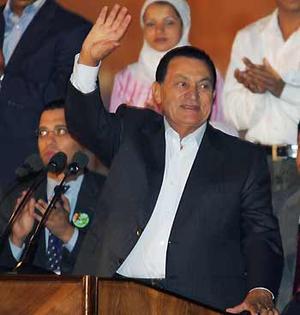Egypt in crisisMubarak to step down after September elections
President Hosni Mubarak announced Tuesday that he will not seek reelection in September; he said on national TV that he will devote his remaining months in office to fashioning a constitutional reform; President Obama welcomed the announcement, saying that Egypt’s transition “must begin now”; he said the United States would be happy to offer assistance to Egypt during that process; Mubarak’s plan appears to divide Egyptians — and the protesters; some are determined to carry on, while others think these are major concessions and that the protests have gone far enough; Egypt’s powerful army vowed that it would not use force against the protesters, despite maintaining a strong presence in central Cairo

Hosni Mubarak plans his exit // Source: chinadaily.com.cn
Egyptian president Hosni Mubarak has said he will not stand for re-election in September, as protests against his rule grow.
Speaking on state TV, Mubarak promised constitutional reform, but said he wanted to stay until the end of his current presidential term.
The announcement came as hundreds of thousands rallied in central Cairo urging him to step down immediately.
President Barack Obama said that Egypt’s transition “must begin now.” He said the United States would be happy to offer assistance to Egypt during that process.
In a short statement, Obama said that it was not his country’s right to dictate the path for Egypt, but that any transition must include opposition voices and lead to free and fair elections.
The BBC reports that Obama’s speech gave mixed messages but was more or less supportive of Mubarak — for the time being.
Monday’s and Tuesday’s demonstrations in Cairo and Alexandria were the biggest since protests began last week.
It remains to be seen whether Mubarak’s statement is enough for the protesters. In fact, Mubarak’s plan could divide Egyptians. Some would be determined to carry on, while others may think these are major concessions and that the protests have gone far enough.
In his address on Tuesday, Mubarak said he would devote his remaining time in power to ensuring a peaceful transition of power to his successor.
“My first priority is to restore peace and stability in our country, to ensure the peaceful transition of leadership, and to ensure that the responsibility goes to whomever the people of Egypt choose in the next election. I do not intend to stand for election again,” he said.
He criticized the protests, though, saying what began as a civilized phenomenon turned into a violent event controlled by cowards. “The events of the past few days require us all — people and leaders — to make the choice between chaos and stability, and dictate new conditions and a new Egyptian reality,” he said.
He said he had offered to meet all parties but some had refused dialogue.
Mubarak ended his speech by saying that he would not leave Egypt. “This is my country. This is where I lived, I fought and defended its land, sovereignty and interests, and I will die on its soil,” he said.
Opposition leader Mohamed el Baradei has dismissed Mubarak’s announcement as “a trick” to remain in power, according to CNN news. El Baradei told the news channel that he wants Mubarak to step down immediately and to hand over power to a caretaker government until elections can be held.
Leaders of the protests had called on Mubarak to step down by this Friday, when demonstrators are planning to march on the presidential palace.
Mubarak’s speech came after a meeting with U.S. special envoy Frank Wisner, who was said to have urged the president to announce his departure.
Meanwhile, the U.K. Foreign Office said it was studying Mubarak’s proposals. “President Mubarak has made some proposals to the Egyptian people. We will study the detail of these. Ultimately the real test will be whether the aspirations of the Egyptian people are met,” it said in a statement.
Mubarak’s speech also comes a day after Egypt’s powerful army vowed that it would not use force against the protesters, despite maintaining a strong presence in central Cairo.
